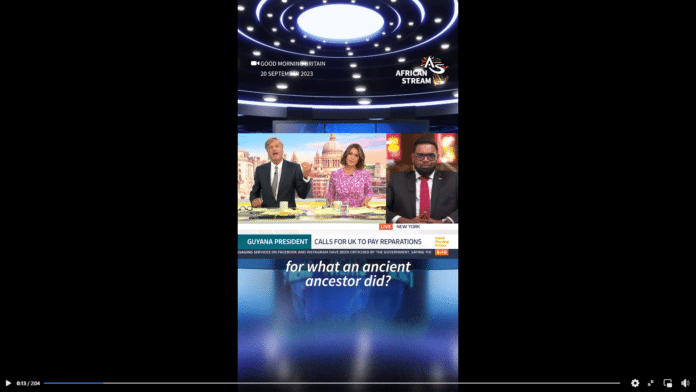The controversy surrounding the impact of the slave trade runs deep. Many argue that the ancestors of those who were victims should be compensated, as we are experiencing the benefits of that time, whereas others deny this and argue that it has nothing to do with those alive now.
The President of Guyana, when asked to explain how people benefit now, does so eloquently and precisely.
Over to Mohamed Irfaan Ali, who is a Guyanese politician. Since 2020, he has served as the tenth president of Guyana. He is the first Muslim to hold the office, along with being the second Muslim head of state in the Americas after Noor Hassanali of Trinidad and Tobago.
More detail:
The Transatlantic Slave Trade, one of history’s darkest chapters, involved the forced transportation of millions of Africans to the Americas as slaves. The profound injustices and atrocities of this trade cannot be overstated, but it is essential to recognise that, centuries later, there are some indirect and unintended contemporary benefits that have emerged from this dark period in human history. Let us shed light on how people today have, in certain ways, benefited from the legacy of the Transatlantic Slave Trade while acknowledging the immense suffering it caused.
- Cultural Enrichment and Diversity
The Transatlantic Slave Trade forcibly brought diverse African cultures together with European and Native American cultures in the Americas, across Europe and beyond. This fusion of cultures led to the creation of entirely new cultural expressions and traditions. For instance, the blending of African rhythms, European melodies, and Native American instruments gave rise to unique musical forms such as jazz, blues, and gospel. These art forms continue to shape the global cultural landscape, bringing joy and inspiration to countless people worldwide.
- Economic Development
The economies of many nations were profoundly impacted by the Transatlantic Slave Trade, with some regions experiencing substantial economic growth. European colonial powers and the United States benefited from the labour of enslaved Africans in agriculture and industry, which laid the foundation for some of the world’s wealthiest economies. While acknowledging the profound moral and ethical issues associated with this economic growth, it is important to recognise that some of the wealth generated has funded investments in education, infrastructure, and technological advancements that continue to benefit people today.
- The Fight for Freedom and Equality
The legacy of the Transatlantic Slave Trade fuelled the struggle for freedom and equality. The abolitionist movements that arose in response to the horrors of slavery laid the groundwork for broader human rights movements. Leaders like Frederick Douglass, Harriet Tubman and Sojourner Truth emerged from the crucible of slavery and became champions of civil rights and equality for all. Their legacy continues to inspire contemporary advocates for social justice and equal rights, contributing to ongoing efforts to address systemic racism and inequality.
- Global Awareness and Solidarity
The memory of the Transatlantic Slave Trade serves as a powerful reminder of the human capacity for cruelty and injustice. Its historical significance has prompted discussions about the legacies of slavery, colonisation, and racism, sparking global awareness and solidarity movements. Today, people around the world are actively engaged in efforts to combat racism, promote social justice and support initiatives aimed at redressing historical injustices.
While the Transatlantic Slave Trade remains a stain on human history, it is important to recognise that, despite its immense suffering and injustice, there are some indirect and unintended contemporary benefits. Cultural enrichment, economic development, the fight for freedom and equality, and global awareness and solidarity have all been influenced by the legacy of this tragic period. However, it is crucial to emphasise that these benefits should never diminish the gravity of the horrors and injustices that took place during the Transatlantic Slave Trade. Acknowledging both the positive and negative aspects of history allows us to learn from the past and work towards a more just and equitable future.
If you would like your interests… published, submit via https://dorseteye.com/submit-a-report/
Join us in helping to bring reality and decency back by SUBSCRIBING to our Youtube channel: https://www.youtube.com/channel/UCQ1Ll1ylCg8U19AhNl-NoTg and SUPPORTING US where you can: Award Winning Independent Citizen Media Needs Your Help. PLEASE SUPPORT US FOR JUST £2 A MONTH https://dorseteye.com/donate/







